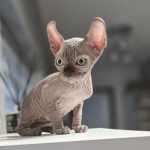The Sphynx cat is a distinctive and unusual breed, instantly recognizable due to its hairless appearance, large ears, and wrinkled skin. Despite their lack of fur, Sphynx cats are known for their warmth—both in body temperature and personality. These affectionate, playful, and social cats have become popular companions, often forming deep bonds with their human families.
Physical Appearance
The Sphynx cat’s most striking feature is its lack of fur, though they are not entirely bald. Many Sphynx cats have a fine layer of peach-fuzz-like down, which gives their skin a soft texture. Their skin comes in a variety of colors and patterns, similar to furred cats, including solid, tabby, and tortoiseshell.
Other key physical characteristics include their:
- Wrinkled skin, especially around the face, neck, and shoulders.
- Large, bat-like ears, which give them an alert and expressive look.
- Almond-shaped eyes, which are typically wide and expressive.
- Muscular, medium-sized body, which is surprisingly strong and agile.
Their bodies are often warm to the touch, as they compensate for the lack of insulating fur by having a slightly higher body temperature than most cats.
Personality and Behavior
Sphynx cats are known for their extroverted and affectionate nature. They thrive on human attention and tend to follow their owners around the house, seeking companionship. These cats are curious, energetic, and playful, often described as dog-like in their loyalty and desire for interaction.
They are also highly social and do well in homes with other pets or children, enjoying the company and stimulation of others. Sphynx cats are often the center of attention, not only because of their unique appearance but also due to their fun-loving and sometimes mischievous personalities. They are known to be intelligent and enjoy playing with interactive toys, climbing, and exploring their surroundings.
Care Requirements
- Skin Care: Unlike furred cats, Sphynx cats need regular skin care. Their skin produces natural oils that are usually absorbed by fur, but since they lack a coat, these oils can build up on the skin. Regular baths (usually once a week) are needed to keep their skin clean and free from excess oil.
- Sun Protection: Sphynx cats are sensitive to sunlight and can get sunburned if exposed for too long. It’s important to keep them indoors or ensure they have proper shade when outside.
- Temperature Sensitivity: Without fur, Sphynx cats can easily get cold, so they may seek out warm spots like sunny windows, blankets, or even their owner’s lap. Many Sphynx cats enjoy wearing sweaters or blankets to stay cozy in cooler weather.
- Diet: A balanced, high-quality diet is essential to maintain their health. Due to their higher metabolism, Sphynx cats may require slightly more food than other cats to maintain their body temperature.
- Ears and Nails: Their large ears can accumulate wax more quickly than other breeds, so they need regular ear cleaning. Their nails also need to be trimmed regularly.
Health Considerations
The Sphynx cat is generally a healthy breed, but they can be prone to certain conditions, including:
- Hypertrophic Cardiomyopathy (HCM): A heart condition that affects the thickness of the heart muscle, which is relatively common in the breed.
- Skin Issues: Some Sphynx cats may be prone to skin infections or acne, particularly if their skin isn’t cleaned regularly.
Routine veterinary care and health screenings are essential to catch any potential health issues early.
Conclusion
Sphynx cats are a unique and loving breed, known for their hairless bodies and warm, affectionate personalities. They require more grooming and care than other breeds due to their lack of fur, but their playful, social nature makes them wonderful companions. With proper care and attention, Sphynx cats can bring endless joy and entertainment to their households.

Leave a Reply
You must be logged in to post a comment.